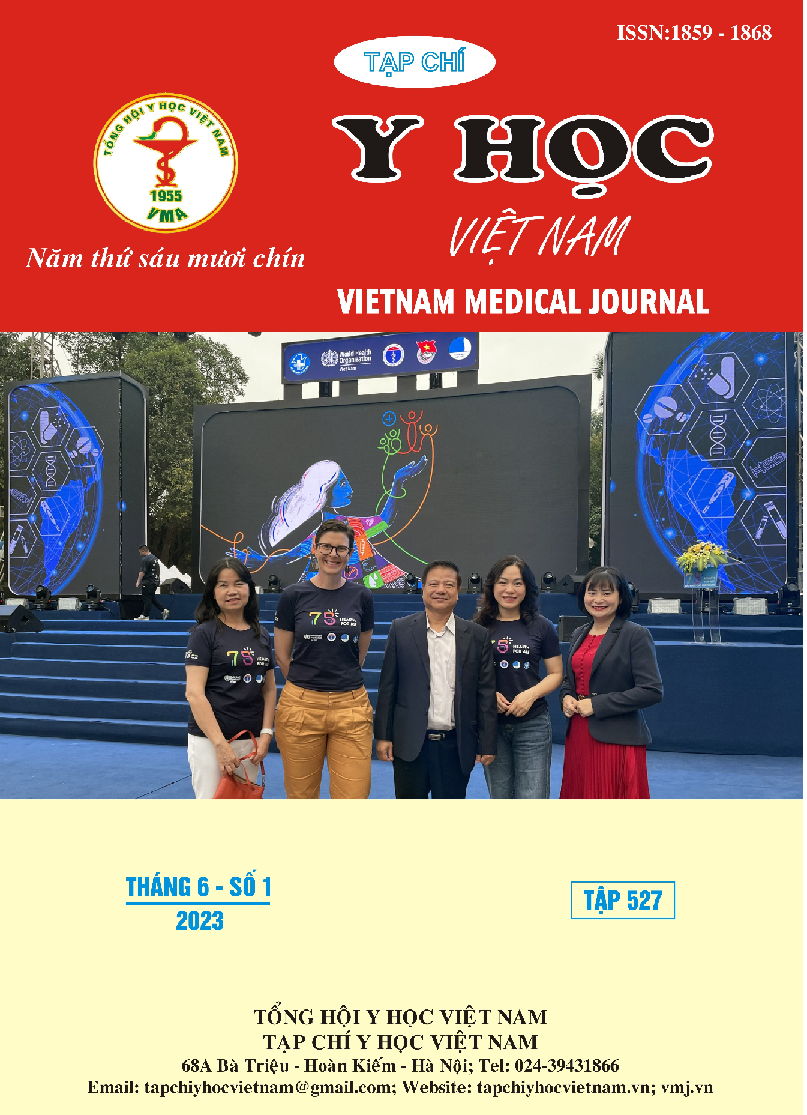THỰC TRẠNG KIẾN THỨC, THÁI ĐỘ VÀ THỰC HÀNH TỰ CHĂM SÓC CỦA NGƯỜI BỆNH UNG THƯ BIỂU MÔ TẾ BÀO GAN ĐƯỢC ĐIỀU TRỊ BẰNG PHƯƠNG PHÁP SỬ DỤNG HÓA CHẤT TẠI CHỖ VÀ TẮC MẠCH NUÔI KHỐI U (TACE) TẠI BỆNH VIỆN ĐẠI HỌC Y DƯỢC THÀNH PHỐ HỒ CHÍ MINH
Nội dung chính của bài viết
Tóm tắt
Mục tiêu: Đánh giá kiến thức, thái độ, thực hành tự chăm sóc của người bệnh UTBMTBG được điều trị bằng phương pháp TACE và xác định một số yếu tố liên quan. Đối tượng và phương pháp nghiên cứu: Nghiên cứu cắt ngang mô tả trên 130 NB UTBMTBG được điều trị bằng TACE tại khoa Ngoại Gan Mật Tụy, Bệnh viện Đại học Y Dược Tp.HCM trong khoảng thời gian từ tháng 12 năm 2022 đến tháng 2 năm 2023 thỏa các tiêu chí chọn mẫu và đồng ý tham gia nghiên cứu được tiến hành phỏng vấn bằng bộ câu hỏi soạn sẵn. Kết quả: Điểm trung bình (ĐTB) kiến thức của NB là 12,49±4,08; trong đó 64,6% (84/130) NB có lượng kiến thức đúng trên 75%. ĐTB thái độ 46,04±3,77; trong đó thái độ tích cực là 25,4%. ĐTB thực hành tự chăm sóc 56,21±6,40; trong đó điểm thực hành ở mức cao là 28,5%. Ngoài ra, nghiên cứu cũng ghi nhận có mối liên quan giữa trình độ học vấn, số lần đã thực hiện TACE. Kết luận: Người bệnh trong nghiên cứu có điểm kiến thức đúng trên 75% khá cao (64,6%). Đối với ĐTB thái độ và thực hành, mặc dù ĐTB tương đối cao nhưng tỉ lệ NB có thái độ tích cực và thực hành ở mức cao còn hạn chế..
Chi tiết bài viết
Từ khóa
Kiến thức, thái độ, thực hành, tự chăm sóc, phương pháp TACE
Tài liệu tham khảo
2. Ngoc AT, Trung HN, Quang LD. IDDF2021-ABS-0070 Predictive performance of the hap score at patients with hepatocellular carcinoma following trans-arterial chemoembolisation (TACE). 2021;70(2):74-75. doi:10.1136/gutjnl-2021-IDDF.77 %J Gut
3. Wang ZX, Li L, Tao FY. Health education helps to relieve postembolization pain during hepatic arterial chemoembolization therapy. Journal of pain research. 2018;11:2115-2121. doi:10.2147/jpr.S166333
4. Saleh DaA, Amr S, Jillson IA, Wang JH-y, Crowell N, Loffredo CA. Preventing hepatocellular carcinoma in Egypt: results of a Pilot Health Education Intervention Study. BMC Research Notes. 2015;8(1):384. doi: 10.1186/s13104-015-1351-1
5. Lou Y, Yates P, McCarthy A, Wang HM. Self-management of chemotherapy-related nausea and vomiting: a cross-sectional survey of Chinese cancer patients. Cancer nursing. 2014;37(2):126-138. doi:10.1097/NCC.0b013e318291b6f5
6. Yehia SA, Morad WS, Hendy OM, Dorgham LS. Effect of health education intervention on hepatocellular carcinoma risk factor prevention in Menoufia governorate, Egypt. Egyptian Liver Journal. 2020;10(1):7. doi:10.1186/s43066-019-0011-x
7. Chardsumon Prutipinyo. Self-Care Behaviours of Chemotherapy Patients. J Med Assoc Thai. 2012; 95(6):30-37.
8. Đoàn Thị Phượng, Phạm Thị Thanh Phương, Bùi Thị Loan. Đánh Giá Hành Vi Tự Chăm Sóc Của Người Bệnh Ung Thư Sau Điều Trị Hoá Chất Tại Trung Tâm Ung Bướu – Bệnh Viện Đa Khoa Tỉnh Hải Dương. Tạp Chí Y học Việt Nam. 2022; 515(1):164-169. doi:10.51298/vmj.v515i1.2700


